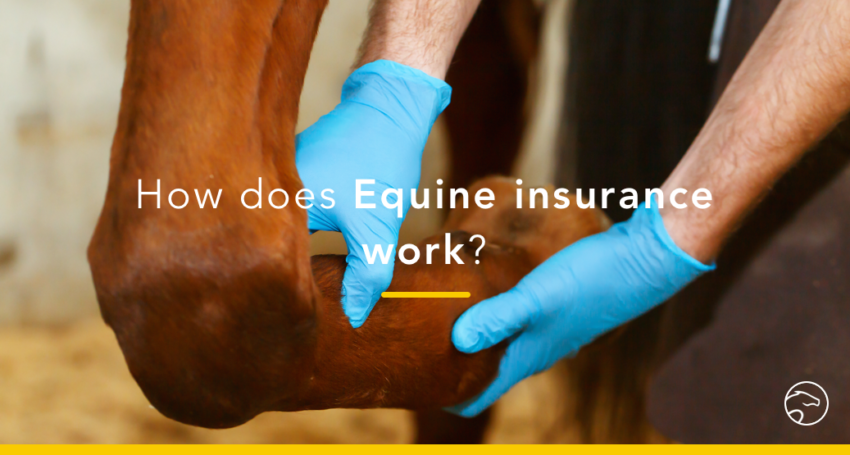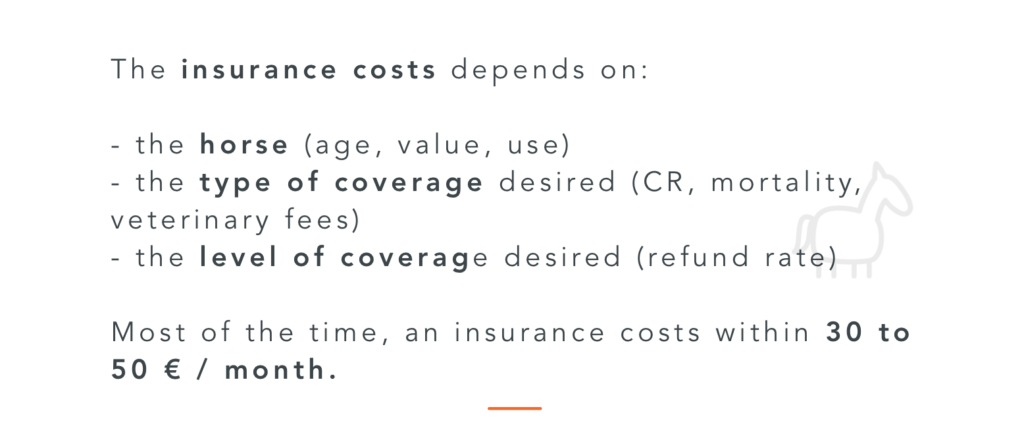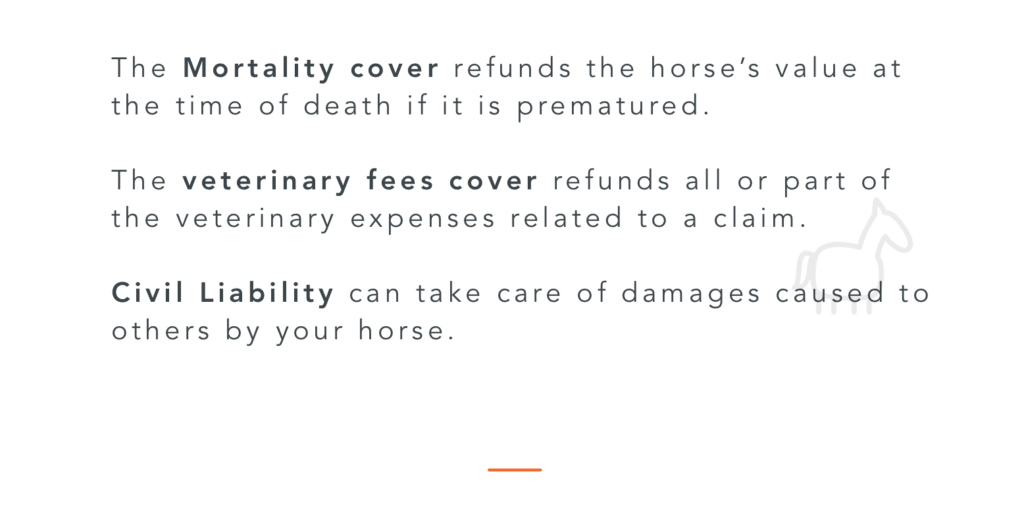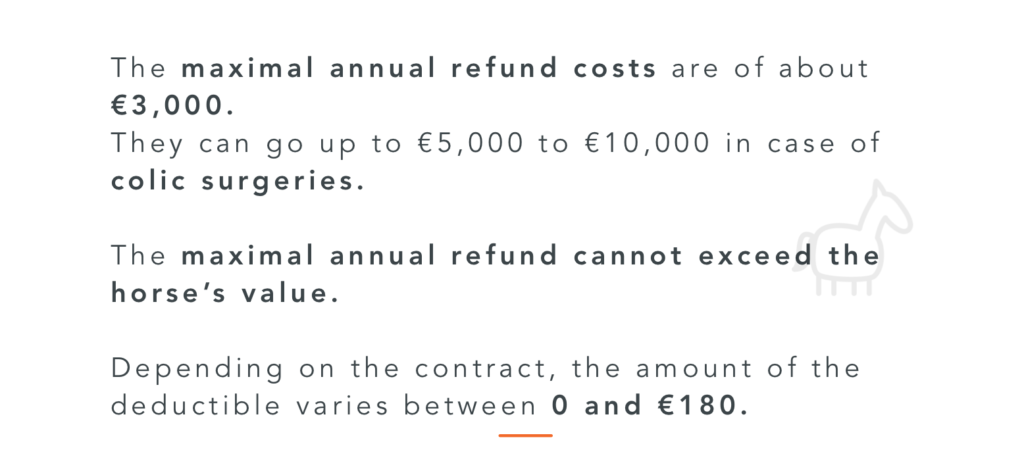
8 Things to know about Equine insurance
I do not know if I’m the only one in this situation but in the past years, my mare’s vet bills have cost me a fortune. Younger, he nickname was “Miss Bandages”😂🤕. If I had more insurance knowledge, I would surely have saved some money … 💸
Between myositis (she has myopathy), colic (when she is stressed), osteoarthritis (she is old), desensitization (she has allergies), emphysema, and other little problems … my wallet has dried out. And then one day my vet told me “Isn’t your horse insured? She should be ! All this would have been refunded… ” At that moment, I started crying. I did not know that it was possible to insure horses for veterinary fees… That’s why I want to tell you more about it, so that you don’t find yourselves in the same situation as me! Here are 8 things to know if you want to insure your horse.

To write this article, I’ve asked a little help from our friends from Cavalassur, the French leaders in horse insurance. I thank them deeply for the time and the valuable information they have given me.😊
Table des matières
- 1 – Overall, how does it work?
- 2 – In which cases is it really important to have my horse insured?
- 3 – Why should I insure my horse?
- 4 – How much does it cost?
- 5 – What does it cover? 👍🏼
- 6 – How much am I refunded for these things? 🤔
- 7 – What is not covered? ⛔
- 8 – Does it also cover old horses with health issues (chronic diseases), etc? 👴🏼
1 – Overall, how does it work?
For those who like me are not champions in paperwork, we will summarize what an insurance is about. 👨🏻🏫
To put it simply, an insurance is a contract between you and an insurer. Every month, you pay a fee that will allow the insurance to refund you (or pay directly) (sometimes very high) costs that would be related to a claim.
A claim can be a car accident, a robbery, a burglary, a fire, an illness …
You must know that insurances are mandatory for houses 🏠 and cars 🚗. Also, in France all citizens benefit from health insurance 🤒 paid by taxes. It is a social security.
Insurances cover unexpected events so you don’t find yourself going bankrupt overnight over a claim. It’s even better when it covers a claim that wasn’t your fault. Imagine having a garbage truck destroying the right side of your car, you will be glad to hear that the insurance covers the repair costs …
Well for horses 🐴 it’s exactly the same. Horses can face claims. For example: they get kicked by a friend, hurt themselves on a fence, get a colic, die … In all those cases, insurances can take in charge all or parts of the expenses related to these claims or even refund the horse’s valueif he dies.

2 – In which cases is it really important to have my horse insured?
In many cases! It’s really important when you:
- Rente a horse or have a horse entrusted to you (it may be required by the owner)
- Cannot afford to pay high veterinary fees
- Want to secure money to buy a new horse in case of death or disability of the current horse
- Want to cover damages your horse can cause to someone else (this is the civil liability)
- Take a half boarder for your horse
- Have a horse of great value
- etc.
3 – Why should I insure my horse?
Simply because it brings serenity. You are covered at any moment under any circumstances and that is great when facing the unexpected. No more gigantic vet bills even in case of glitch.
4 – How much does it cost?
It varies according to several criteria:
- The refund level you wish to have. As you can imagine, the monthly costs will be higher if the insurance covers the totality of the bill.
- The horse’s age
- The horse’s value
- The horse’s purpose
Let’s take the example of Cavalassur which is one of the best known horse insurer in France. The monthly costs are of about 30 to 50 € / month (for a Mortality + Veterinary fees pack). It can go up to € 300 a month, for horses of very high values.

5 – What does it cover? 👍🏼
There are three contracts’ types: mortality, veterinary fees and civil liability. And also several refund levels
Mortality ⚰
The mortality contract refunds the horse’s value if he dies of illness or of an accident. So it does not cover natural death … 👴🏼
The way it is being managed depends on the insurance itself. For example, at Cavalassur, when setting the contract you will have to enter the value of the horse. This one is then validated by the insurer. The owner is then refunded for this exact value without depreciation or decrease due to age or performance at the time of death.
In the case of very high value horses (> 50.000 €), justifying documents can be requested to attest to its real value at the moment of the death (such as competition results).
Most of the time, the mortality contract is the most basic warranty. Other warranty are seen as extensions.
Veterinary fees 💉
The “Veterinary fees” contract refunds all or parts of the veterinary costs caused by a claim.
Those contracts do not cover regular costs such as vaccinations and deworming. Except for expensive contracts for which a part of those regular costs can be covered. Otherwise it’s like cars, there must be a claim for the costs to be covered. If insurances paid us gas and oil, it would be known. 😂
What is a claim?
A claim is basically a big health problem. They are classified into 3 types: accident / surgery / illness.
An accident can be: an injury made in the meadow because the horse lost a shoe and got injured. A disease can be: myositis, a colic, gastric ulcers, osteoarthritis … And a surgery can occur: if the horse has to be operated due to cornea, a fracture, a colic…
📚Read more: The 3 things to avoid when feeding your horse
And what does it cover?
Depending on the level of coverage, it can cover parts or all (50 to 100%) of the veterinary fees related to this same claim. So veterinary fees, medicines, radios, ultrasounds, MRIs, scintigraphies, laboratory tests, acupuncture and osteopath (only if prescribed by a veterinarian in connection with the incident), orthopedic shoeing …
Civil liability
Civil liability is very very strongly recommended for all equine owners. It is even mandatory for competition horses. In fact, it covers damages (material or immaterial) that your horse can cause to someone or something, wether it is ridden or not.
To be more precise, it is in divided in two:
- When the horse is ridden it is the RC of the rider (we talk about riding action)
- When the horse is nor ridden, it is the RCPE (equine owner)
Let’s take a very simple example: if your horse pushes a pedestrian which then breaks his arm, your CPEP can help cover the pedestrian’s health costs.

6 – How much am I refunded for these things? 🤔
In the case of veterinary costs refund, there is an annual maximum of €3,000. It can depend on the contract and go up to €6,000 for more expensive contracts. This means that each year the insurance refunds a maximum of 3000€ (or 6.000€) of veterinary costs.
However, there are variations:
- The insurance only covers a maximum of €1,500 per year for tendonitis, slamming, osteitis, sprains, ligament tears (€1,500 is left for the refund of everything else).
- The annual maximum can increase to €5,000 per year (even up to €10,000 depending on the contracts) in case of colic surgery. That is to say, if your horse needs to have colic surgery, the insurance won’t only refund €3,000 but €5,000 through out the year.
However, the the annual refund cannot exceed the horse’s value. So if your horse is worth let’s say €2,500, the insurance will not refund you more than €2,500 / year. You can also choose the insurance value you want according to this criteria! 😉
📚Read more: My horse has tendinitis; how bad is it?
The waiting period ⏳
For some claims, the waiting period can go up to 1 year.
Please note that depending on the pathologies and whether or not a veterinary certificate is available at the time of subscription, a waiting period applies. That is to say, claims’ refund only apply after this waiting period.
For example, in the case of robbery, the waiting period is 30 days. This means that you will only be refunded if your horse is stolen 30 days after the contract was signed.
The franchises
You too have heard 1,000 times that Carglass ad where Olivier talks about franchising and still don’t know what it is?
A franchise is a minimum amount that must be payed by you even if the insurance covers the rest.
In the case of your horse, you can have a deductible of 150€ (it goes from 0 to 180€ depending on the contract). This means that whatever the claim, you will have to pay on your own at least €150. This means that for expenses below this deductible, the insurance will not refund you. However, even if it’s not refunded, it’s still good to declare it. Indeed, there may be additional costs (a second or third vet visit for example), which would ultimately result in the amount of the deductible being exceeded. In this case you can get a refund for the rest.
Let’s take two examples.
Example 1️⃣
I have a Comfort + contract by Cavalassur, which covers 100% of accident costs and 70% of illness costs with a deductible of €150.
My horse has a hock osteoarthritis. The costs incurred are as follows: vet visit + radio + Tildren. Total: €700
€700 of fees x 70% of refund = €490
€490 – €150 deductible = €340 refunded
€700€ – €340 refund = €360 at my expense
Example 2️⃣
3 months later my horse hurts himself in his box and has an open wound. The costs incurred are as follows: 4 vet visits for wound care + suture + medication = €350. Visit of an osteopath prescribed by the attending veterinarian = €90. Total: €440.
€440 of fees x 100% of refund = €440
€440 – €150 deductible = €290 refunded
Remain €150 at my charge
In all, without insurance you would have paid €1,140. With the insurance you will only pay €510 (+ the insurance costs).

7 – What is not covered? ⛔
Depending on the contract, some costs may not be covered. Typically osteopathic expenses, transport and stabling expenses in clinics, etc. are sometimes covered, sometimes not. It is up to you to choose wether you want it covered or not.
On the other hand, some things are just never covered:
- Death due to castration, doping, lack of voluntary care, administrative slaughter
- Convenience, comfort, aesthetic or maintenance treatment costs(castration, food supplements such as a garlic cure for example or osteopathic manipulation for prevention or maintenance, not related to a claim…),
- Expenses related to a claim that occurred before the insurance became effective.
8 – Does it also cover old horses with health issues (chronic diseases), etc? 👴🏼
It depends on the insurance. At Cavalassur you can cover:
- Horses with a known pathology. The costs linked to the pathology will not be refunded . Since it is prior to subscription, it makes the coverage of this pathology prohibited by the insurance code. On the other hand, the horse can be insured for other claims. For example, if the horse already has osteoarthritis when taking the insurance, you will not be refunded for osteoarthritis treatments. However, if an accident causes a wound, it will be covered.
- Older horses. There is a veteran guarantee for up to 30 years old horses. However, with this coverage, there are quite a few other refunds that fall out of the package.

Camille Saute,
Resp. R&D at Equisense